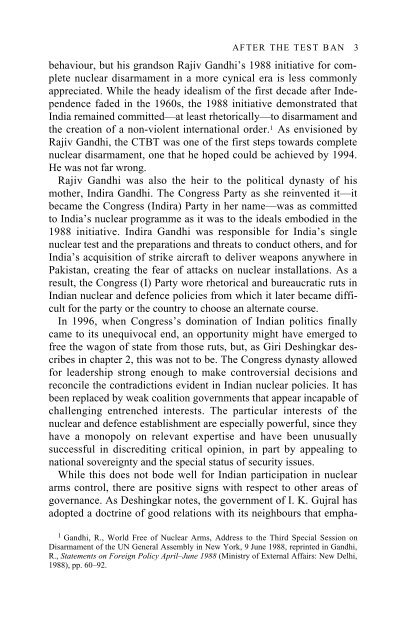Nuclear Weapons and Arms Control in South Asia after the Test Ban
Nuclear Weapons and Arms Control in South Asia after the Test Ban
Nuclear Weapons and Arms Control in South Asia after the Test Ban
Create successful ePaper yourself
Turn your PDF publications into a flip-book with our unique Google optimized e-Paper software.
AFTER THE TEST BAN 3<br />
behaviour, but his gr<strong>and</strong>son Rajiv G<strong>and</strong>hi’s 1988 <strong>in</strong>itiative for complete<br />
nuclear disarmament <strong>in</strong> a more cynical era is less commonly<br />
appreciated. While <strong>the</strong> heady idealism of <strong>the</strong> first decade <strong>after</strong> Independence<br />
faded <strong>in</strong> <strong>the</strong> 1960s, <strong>the</strong> 1988 <strong>in</strong>itiative demonstrated that<br />
India rema<strong>in</strong>ed committed—at least rhetorically—to disarmament <strong>and</strong><br />
<strong>the</strong> creation of a non-violent <strong>in</strong>ternational order. 1 As envisioned by<br />
Rajiv G<strong>and</strong>hi, <strong>the</strong> CTBT was one of <strong>the</strong> first steps towards complete<br />
nuclear disarmament, one that he hoped could be achieved by 1994.<br />
He was not far wrong.<br />
Rajiv G<strong>and</strong>hi was also <strong>the</strong> heir to <strong>the</strong> political dynasty of his<br />
mo<strong>the</strong>r, Indira G<strong>and</strong>hi. The Congress Party as she re<strong>in</strong>vented it—it<br />
became <strong>the</strong> Congress (Indira) Party <strong>in</strong> her name—was as committed<br />
to India’s nuclear programme as it was to <strong>the</strong> ideals embodied <strong>in</strong> <strong>the</strong><br />
1988 <strong>in</strong>itiative. Indira G<strong>and</strong>hi was responsible for India’s s<strong>in</strong>gle<br />
nuclear test <strong>and</strong> <strong>the</strong> preparations <strong>and</strong> threats to conduct o<strong>the</strong>rs, <strong>and</strong> for<br />
India’s acquisition of strike aircraft to deliver weapons anywhere <strong>in</strong><br />
Pakistan, creat<strong>in</strong>g <strong>the</strong> fear of attacks on nuclear <strong>in</strong>stallations. As a<br />
result, <strong>the</strong> Congress (I) Party wore rhetorical <strong>and</strong> bureaucratic ruts <strong>in</strong><br />
Indian nuclear <strong>and</strong> defence policies from which it later became difficult<br />
for <strong>the</strong> party or <strong>the</strong> country to choose an alternate course.<br />
In 1996, when Congress’s dom<strong>in</strong>ation of Indian politics f<strong>in</strong>ally<br />
came to its unequivocal end, an opportunity might have emerged to<br />
free <strong>the</strong> wagon of state from those ruts, but, as Giri Desh<strong>in</strong>gkar describes<br />
<strong>in</strong> chapter 2, this was not to be. The Congress dynasty allowed<br />
for leadership strong enough to make controversial decisions <strong>and</strong><br />
reconcile <strong>the</strong> contradictions evident <strong>in</strong> Indian nuclear policies. It has<br />
been replaced by weak coalition governments that appear <strong>in</strong>capable of<br />
challeng<strong>in</strong>g entrenched <strong>in</strong>terests. The particular <strong>in</strong>terests of <strong>the</strong><br />
nuclear <strong>and</strong> defence establishment are especially powerful, s<strong>in</strong>ce <strong>the</strong>y<br />
have a monopoly on relevant expertise <strong>and</strong> have been unusually<br />
successful <strong>in</strong> discredit<strong>in</strong>g critical op<strong>in</strong>ion, <strong>in</strong> part by appeal<strong>in</strong>g to<br />
national sovereignty <strong>and</strong> <strong>the</strong> special status of security issues.<br />
While this does not bode well for Indian participation <strong>in</strong> nuclear<br />
arms control, <strong>the</strong>re are positive signs with respect to o<strong>the</strong>r areas of<br />
governance. As Desh<strong>in</strong>gkar notes, <strong>the</strong> government of I. K. Gujral has<br />
adopted a doctr<strong>in</strong>e of good relations with its neighbours that empha-<br />
1 G<strong>and</strong>hi, R., World Free of <strong>Nuclear</strong> <strong>Arms</strong>, Address to <strong>the</strong> Third Special Session on<br />
Disarmament of <strong>the</strong> UN General Assembly <strong>in</strong> New York, 9 June 1988, repr<strong>in</strong>ted <strong>in</strong> G<strong>and</strong>hi,<br />
R., Statements on Foreign Policy April–June 1988 (M<strong>in</strong>istry of External Affairs: New Delhi,<br />
1988), pp. 60–92.

















